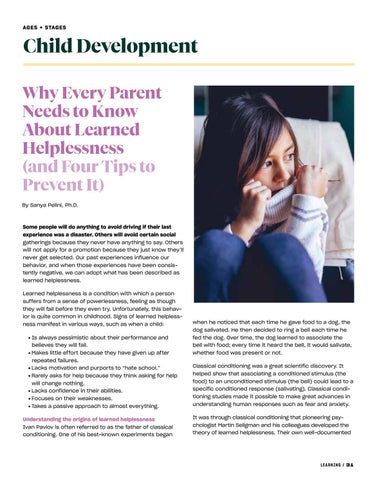AGES + STAGES
Child Development Why Every Parent Needs to Know About Learned Helplessness (and Four Tips to Prevent It) By Sanya Pelini, Ph.D.
Some people will do anything to avoid driving if their last experience was a disaster. Others will avoid certain social gatherings because they never have anything to say. Others will not apply for a promotion because they just know they’ll never get selected. Our past experiences influence our behavior, and when those experiences have been consistently negative, we can adopt what has been described as learned helplessness. Learned helplessness is a condition with which a person suffers from a sense of powerlessness, feeling as though they will fail before they even try. Unfortunately, this behavior is quite common in childhood. Signs of learned helplessness manifest in various ways, such as when a child: • Is always pessimistic about their performance and believes they will fail. • Makes little effort because they have given up after repeated failures. • Lacks motivation and purports to “hate school.” • Rarely asks for help because they think asking for help will change nothing. • Lacks confidence in their abilities. • Focuses on their weaknesses. • Takes a passive approach to almost everything. Understanding the origins of learned helplessness Ivan Pavlov is often referred to as the father of classical conditioning. One of his best-known experiments began
when he noticed that each time he gave food to a dog, the dog salivated. He then decided to ring a bell each time he fed the dog. Over time, the dog learned to associate the bell with food; every time it heard the bell, it would salivate, whether food was present or not. Classical conditioning was a great scientific discovery. It helped show that associating a conditioned stimulus (the food) to an unconditioned stimulus (the bell) could lead to a specific conditioned response (salivating). Classical conditioning studies made it possible to make great advances in understanding human responses such as fear and anxiety. It was through classical conditioning that pioneering psychologist Martin Seligman and his colleagues developed the theory of learned helplessness. Their own well-documented
LEARNING / 31
